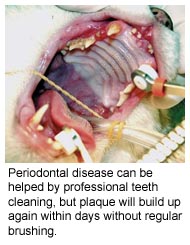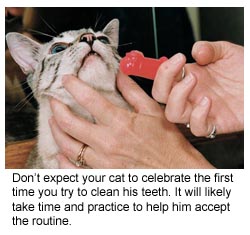Bad Breath: Sign of Illness?
Forget the mints - start a dental hygiene plan for your cat.
Go nose-to-nose with your sleeping cat and give her a loving sniff. If it's not sweet kitty breath that you know and love, but a stench that makes you wince, something may not be right. Just as the eyes may be windows into the soul, a kitty's breath may hint to her health.
"A healthy cat's breath should not be offensive," says Eric Davis, DVM, a fellow of the Academy of Veterinary Dentistry and former director of the Dental Referral Service at Cornell University's College of Veterinary Medicine.
Many Different Causes
Bad breath, in fact, may indicate conditions from periodontal, kidney, respiratory or liver disease to diabetes, skin disease (involving tissue around the lips) or oral trauma, such as electric cord injury. "However, by far, the most common problem associated with bad breath is periodontal disease," says Dr. Davis. "Just think how your breath would smell if you didn't brush your teeth for a week, months or even years."
 Without good dental care, this preventable disease is likely to cause pain, tooth loss, and infection that, in some cases, can spread to other organs. Without tooth brushing, a film called plaque adheres to the teeth. Over time, this film thickens and hardens, attracting even more plaque. The gums will swell with gingivitis, eventually leading to tissue and bone loss. Early stages of periodontal disease can be remedied with professional teeth cleaning, which would give your cat a fresh start, but plaque will build up again within days without regular tooth brushing.
Without good dental care, this preventable disease is likely to cause pain, tooth loss, and infection that, in some cases, can spread to other organs. Without tooth brushing, a film called plaque adheres to the teeth. Over time, this film thickens and hardens, attracting even more plaque. The gums will swell with gingivitis, eventually leading to tissue and bone loss. Early stages of periodontal disease can be remedied with professional teeth cleaning, which would give your cat a fresh start, but plaque will build up again within days without regular tooth brushing.
Another common cause of bad breath, however, is something caught in your cat's teeth or under her gums," says Dr. Davis. "Food or a strand of hair or string, for example, can get lodged in the little nooks and crannies between teeth and can decompose, soon infecting the surrounding tissue."
Bad breath can also be a sign of diabetes if the breath is sweet, kidney disease if it's urine-like, or liver disease or an intestinal blockage if it's foul (see sidebar). Bad breath can also be the result of a mouth ulcer, mouth sores or even cancer.
To prevent most cases of bad breath, brush your cat's teeth - ideally, every day - using tooth gel for felines. "Link the brushing to a treat, such as drinking water from a dripping faucet or a favorite canned food," advises Dr. Davis. "Just before the treat, you can apply a tiny amount of the gel onto a finger and gently apply it to the cat's teeth. Most cats will forgive your foolish human behavior to savor their desired food or beverage.
Repeat this procedure every day for the first week to establish the new routine. Then, apply the gel a little further back in the mouth, but still without stressing the cat."
 If you grip your cat and jam a toothbrush down her throat, the battle is lost. Once the cat is tolerant of the gel on the finger prior to receiving the cherished item, try the same routine with the gel on the brush rather than the finger.
If you grip your cat and jam a toothbrush down her throat, the battle is lost. Once the cat is tolerant of the gel on the finger prior to receiving the cherished item, try the same routine with the gel on the brush rather than the finger.
Because cats hate having their mouths forcefully opened, simply stretch back the lips without opening the mouth. Don't bother the tongue side of the teeth or focus too much on the motion. You simply want to disrupt the plaque buildup at the margin between the tooth and the gumline.
The younger your cat, the easier it will be to brush her teeth. Never use toothpaste for humans because some of its components can upset a cat's stomach. And never force the issue; it's not worth putting yourself at risk. Some veterinarians believe that dry food is also better than canned food to prevent plaque buildup.
Occasional Halitosis is Okay
Not all cases of bad breath, however, indicate a health problem. Food smells that are repulsive to you - but gusty to your cat - can be harmless. Your cat's breath may be pretty pungent, for example, after she chows down some smoked oysters or canned tuna.
"Nevertheless, consistent bad breath should be checked by a veterinarian," states Dr. Davis. "Halitosis is a common complaint of cat owners and veterinary examination is usually necessary to identify the cause.
Your cat may need a professional tooth cleaning, an antibiotic to clear up an infection, or other medication for a serious disorder that could jeopardize your cat's health, such as kidney or liver disease."
This article originally appeared in Cat Watch.




